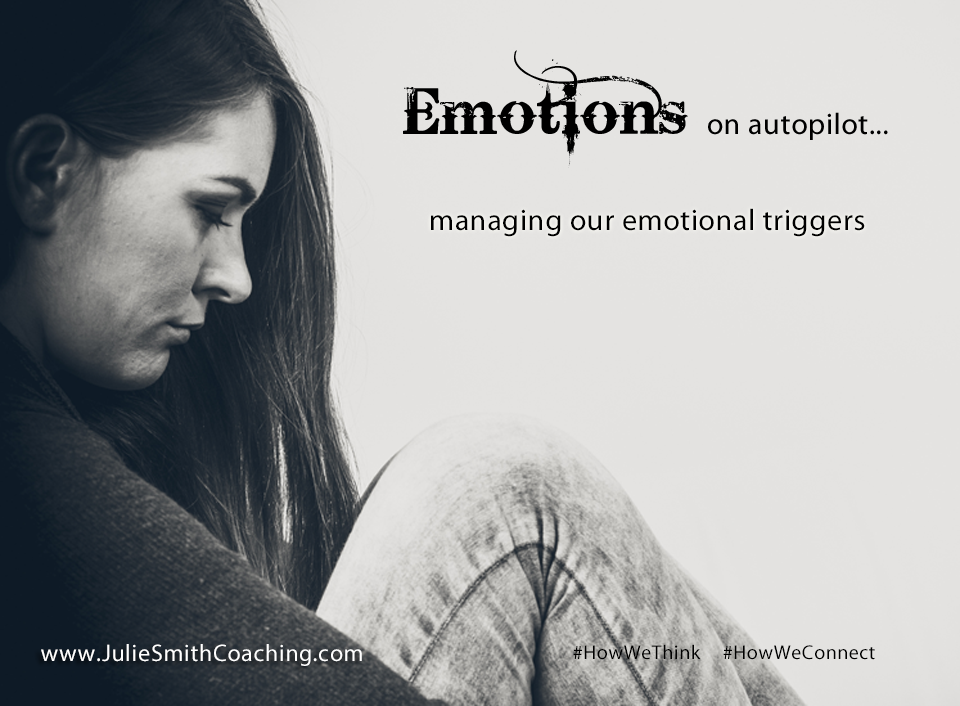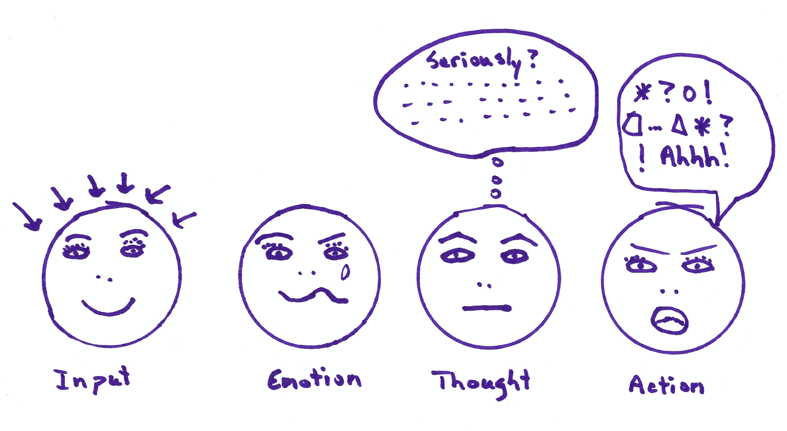 Do you ever find yourself responding to certain situations, things or interactions with an immediate response? Perhaps similar situations, things or interactions almost always result in the same automatic response in you? Yep, me too. Emotions are automatic. Often, how we respond is automatic too. Over time, we’ve learned (correctly or incorrectly) to believe certain things about ourselves, others, or situations because of past experiences and the messages we perceived and absorbed from them.
Do you ever find yourself responding to certain situations, things or interactions with an immediate response? Perhaps similar situations, things or interactions almost always result in the same automatic response in you? Yep, me too. Emotions are automatic. Often, how we respond is automatic too. Over time, we’ve learned (correctly or incorrectly) to believe certain things about ourselves, others, or situations because of past experiences and the messages we perceived and absorbed from them.
This post continues a series on Emotional Intelligence. Previously, I talked about our body’s emotional chemical process that influences not only the body, but how our thoughts interact with our emotions. I’ve also shared that that we don’t have to believe everything our thoughts tell us.
Our Emotional Response Process
The image below is my silly illustration of how this process works…
Now, I’d like to give you an amusing, yet personal, example to help apply this. Remember, we have approximately six seconds for an emotion chemical to travel through the body, deliver its message to a cell, and be recycled. While that’s not very long, it is long enough for us to learn to be mindful, aware, and choose a response rather than react. My example…
- I walk into my kitchen and for the 800th time, it appears that almost every cupboard door is open in the kitchen. (the input)
- I instantly feel annoyed and angry. (the emotion)
- Seriously? They left them open again? How difficult is it to close the darn doors? (my thoughts)
- I then express my irritation through contorted facial expression and aggressive tone of voice as I yell at whichever family members are close enough to hear, “What’s with you people? Is it so hard to shut a cupboard door?” (my action)
The Emotion Behind the Emotion
Anger was the loudest or most obvious emotion. It’s easy to notice that one and the obvious emotion is the one we tend to focus on. But what if we dig deeper? There’s almost always other feelings surrounding the obvious one.
Well, if I dig deeper into this silly scenario, perhaps I feel unheard because I’ve repeatedly asked family members to please shut the cupboard doors. It maybe feels like I’m not being listened to. Maybe I feel hurt because my past requests for others to shut cupboard doors have been disregarded.
This is a funny example, but perhaps you can begin to see how this might apply to a variety of situations or experiences in your own life. All these feelings we experience layer together to create a complex and sometimes confusing tapestry of feelings and emotions that in turn affect our reactions and behaviors.
Practice Layered Feelings Awareness
When you notice yourself automatically or instinctively responding to something in a certain way, stop for just a moment. Ask yourself, “what else am I feeling?” If you’re able, take a moment to write it down. What color is that feeling? What texture is it? Where do you feel it in your body? Examine that tapestry of feelings that you’re experiencing. How are they affecting one another? How are they affecting you?
As you practice this, when you act with an automatic or triggered response, you’ll get better at noticing the mixture of feelings you’re experiencing, rather than just the obvious one you tend to focus on. This will help you get better at understanding why you are thinking and acting the way you do. Acknowledge it. Now you can choose what you want to do with that information.
Learn it. Apply it.
- Where and in what situations do you notice yourself stepping into an automatic response?
- What are the layers of feelings you experience beyond the obvious one?
- How do those feelings affect one another and how you think and act?
- What will you do with that new awareness?
- How might that impact you, personally, or a relationship you have?


 I'm Julie Smith, Certified Life Coach, ADHD Coach, and Executive Function Coach. I empower others to create calm, clarity, and connection at work, school and at home. Together, we create a customized approach to help you focus, overcome obstacles, build confidence, and achieve your goals. My clients include both professionals and families (parents, children, teens).
I'm Julie Smith, Certified Life Coach, ADHD Coach, and Executive Function Coach. I empower others to create calm, clarity, and connection at work, school and at home. Together, we create a customized approach to help you focus, overcome obstacles, build confidence, and achieve your goals. My clients include both professionals and families (parents, children, teens).